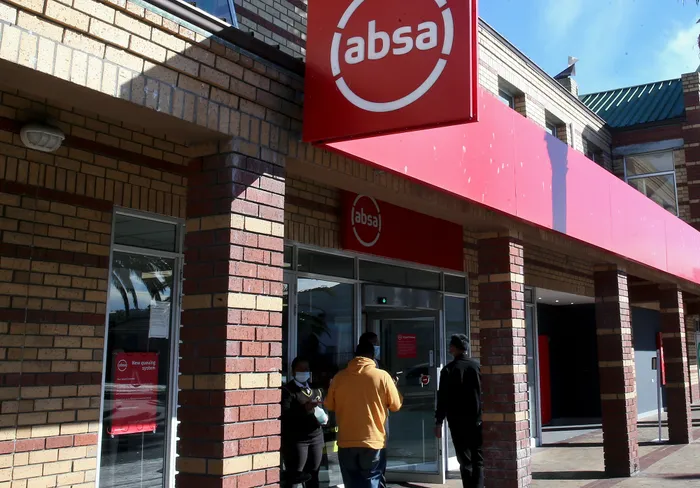
Absa Group will undergo a strategy review over the next two months while itsleadership structures will be strengthened, said CEO Kenny Fihla, who was appointed in June.
Image: File
Absa Group’s frequent leadership changes over the past few years mean its business units and operations may be running on “auto-pilot,” and the bank’s strategy will be sharpened over the next two months, the bank’s CEO Kenny Fihla said on Monday.
Speaking at the bank’s online interim results presentation, Fihla, who has been CEO since June 17, said there were a “whole range of initiatives” underway at the group, which gave him confidence that it would reach a return on equity (ROE) of 16% - although the ROE target for the 2026 financial year had not formally been set yet.
However, he said these initiatives were designed to stabilise the group, and a “reset” was needed to “sharpen the focus” of the organisation.
He said since he had become CEO, he had engaged with stakeholders and executives across the 16 countries in Africa where the group operates, and in South Africa, and there were two “common threads” from these meetings: a concern about high management churn, while part of the business had become inward-focused.
Fihla said the leadership team needed to be strengthened overall, and this would be a priority for him in the short term.
He said, for example, that opportunities in the bank’s Africa Regions business unit had not yet been fully leveraged. The Africa Regions unit was operating pretty much separately from the other business units, and the other business units needed to align better with the pan-Africa focus, he said.
Also, “we are still too product-focused; we need to shift the focus to our client.”
He said there also needed to be clearer focus on market segments where the group could take advantage of opportunities, and “we can't play everywhere.”
He said there remained several areas where “bad costs” could be eliminated, and capital deployment needed to be optimised. He said the 15% target ROE (for the full 2025 financial year), although set as part of a recovery strategy, was not acceptable because the group’s costs were rising at a faster rate.
Meanwhile, Absa delivered a strong financial performance for the first half of 2025, with headline earnings up 17%, as credit impairments declined and pre-provision profit grew.
Revenue increased, underpinned by strong non-interest income growth and stable net interest income, reflecting solid revenue contributions from all divisions. The group had saved R700 million in costs in the first half; these savings were expected to amount to R800m in the second half.
From a geographic perspective, double-digit earnings growth was delivered by the South African operations, mainly due to lower impairments, while Africa regions’ performance was mainly driven by strong pre-provision profit growth, as underpinned by strong customer growth.
“Our interim earnings performance demonstrates good progress on strategic priorities during this period, including operational reorganisation and divisional alignment, and enhanced client focus,” said Fihla.
ROE for the first half was 14.8%. Impairments fell 14% and played a significant role in delivering earnings growth and included a robust collections strategy, credit model enhancements, and changes to new-business lending criteria, particularly in vehicle asset finance and unsecured lending.
The credit-loss ratio reduced in line with guidance and is at the top end of Absa’s through-the-cycle target range at 100 bps.
“Among the key contributors to our performance are a notable improvement in our credit-loss ratio, strong growth in non-interest income, particularly trading, and cost management supported by our productivity program,” said Deon Raju, group financial director.
To date, Absa had achieved R2.4 billion of the R5bn savings it had committed to achieving by 2027 under a productivity program launched in 2024.
Most business units reported strong earnings growth. The newly formed Personal and Private Banking (PPB) unit increased headline earnings 23% to R3.2bn due mainly to lower credit impairments, despite muted revenue growth from modest industry loan expansion and a more conservative risk appetite in lending.
Corporate & Investment Banking (CIB) headline earnings were 10% higher at R6.4bn after benefiting from lower credit-related impairments and robust trading revenue, although net interest income growth remains constrained. CIB contributed more than half of the group’s earnings.
Absa Regional Operations’ contribution increased 35% to R1.1bn following strong growth in revenue and pre-provision profit, with a significant improvement in headline earnings. These results were supported by strong customer acquisition and fee income growth, which helped offset higher credit-related impairments.
Absa Group’s customer base increased 2% to 12.8 million in the first half of the year, and group-wide digitally active customers increased 8% to 5 million customers. For the full year, Absa’s guidance for 2025 was largely unchanged, and mid-single-digit revenue growth was expected, while the ROE was forecast to be around 15%.
BUSINESS REPORT